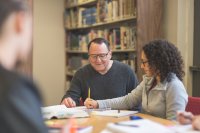Overcoming the Isolation of Rural Teachers
Finding a sense of community is sometimes a challenge for rural teachers, but these six strategies can help.
Your content has been saved!
Go to My Saved Content.Sometimes we take the little things for granted. Knocking on a teacher’s door to borrow a lesson plan or dropping into a colleague’s room to chat about content—these little everyday occurrences are rare luxuries when you’re a rural teacher and may be the only one for miles who teaches your subject area or grade level.
Isolation can be challenging for many rural teachers. The lack of opportunities to connect with and learn from peers takes away one of the greatest professional learning opportunities teachers have—each other.
In addition, professional development (PD) that might offer the opportunity for rural educators to convene and connect has some drawbacks:
- Distance: PD can be hours away—we’re talking four to six hours away.
- Logistics: Some districts might have only one or two substitutes, making it impossible for a group of teachers to attend a training or to go for multiple days.
- Quality: Rural teachers are often offered one-off sit-and-get PD that often doesn’t prove effective, provide time for implementation, or allow teachers to build relationships with one another.
So how do you find creative ways for teachers to connect with and learn from one other? How do you create meaningful professional learning regardless of distance?
These questions led Darcy, a teacher from North Dakota, to take a break from the classroom and become a teacher ambassador for Prairie Public Broadcasting. Her mission: to pilot and play with effective ways for teachers, particularly rural teachers, to overcome professional isolation. In that work, she’s uncovering ways to help teachers innovate, connect with each other, and discover new tools and techniques to improve teaching and learning in spite of the distance between them.
6 Ways to Overcome Professional Isolation
1. Collaborate through Edcamps: An Edcamp ND board was created to help schools and organizations run Edcamps at multiples sites at the same time. Using virtual platforms, educators can connect to peers of similar grade level and subject area expertise regardless of location.
2. Try a virtual classroom: In a weekly web chat, featured educators take the spotlight and share a bite-size overview of a resource, topic, or idea they love and work with others on how to do similar work in their classrooms. This virtual “unconference” is recorded for those who can’t attend, so they can watch on their own time. Attendees can earn continuing ed credits for participating.
3. Set up virtual PLCs: Virtual classrooms can segue into virtual professional learning communities (PLCs), but this requires an awareness of how to use PLCs as a professional learning tool. Through collaborative conversations, district leaders can work together to provide a common time for teachers of similar subjects or grade levels to connect virtually and learn together. Ideally, districts are within an hour of each other, allowing for classroom visits and the potential to meet in person.
4. Personalize traveling PD: Darcy has the freedom to travel to and work with schools to provide professional development tailored to their specific needs. After sharing new techniques and topics, whether in person or virtually, Darcy is available to provide ongoing support for teachers as they implement and test new strategies in their classrooms, serving as a co-teacher or modeling techniques. This personalized approach provides teachers with much-needed follow-through that makes PD effective.
5. Offer continuing education credit for innovation: This fall, Darcy is launching a hybrid PD course, the Educator Innovation Lab, which allows educators to get credit for testing new ideas and techniques in their classrooms. With a combination of in-person and virtual support, teachers will be able to share resources while earning PD credit for implementing their own ideas for improving teaching and learning in their classrooms.
6. Provide infrastructure support: Finally, working collaboratively with several state agencies, Darcy helped usher a state-wide PD calendar into development. Set to launch this fall, the new calendar will provide teachers a way to search all the PD offered in the state so they can find PD that’s meaningful and relevant to them.
Purposeful conversations and meaningful connections between teachers are powerful learning tools for educators. Working together, we can develop ways to give teachers the time and opportunity to connect to one another and access high-quality PD that helps reduce teacher isolation.
